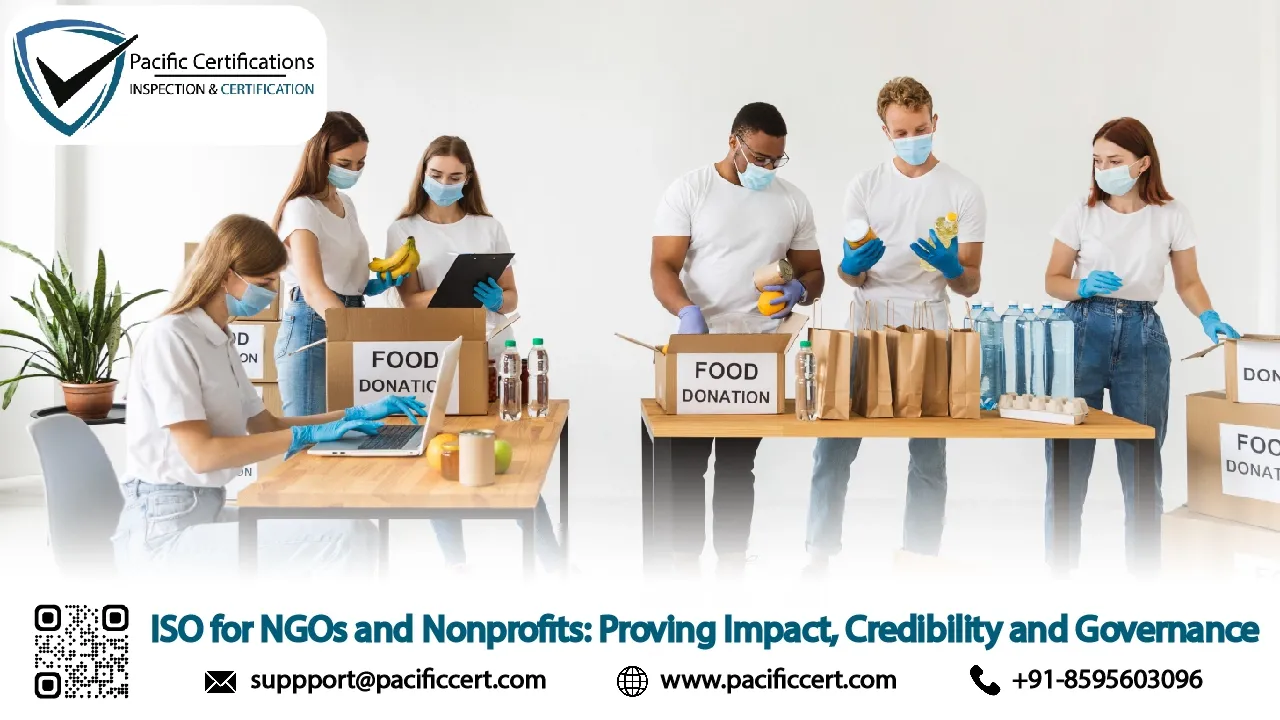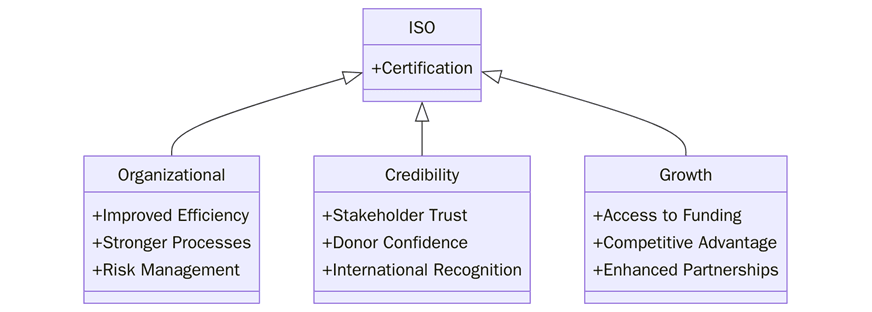ISO for NGOs and Nonprofits: Proving Impact, Credibility and Governance

Introduction
Nonprofits and NGOs operate in environments where accountability, trust and impact measurement are critical. Donors, governments and communities increasingly demand proof that funds are well managed, programs are transparent and outcomes are measurable. In 2025, international standards like ISO provide NGOs with the credibility and governance tools they need to remain competitive in a crowded funding landscape.
Start your ISO certification process with Pacific Certifications to improve governance and strengthen donor relationships.
Quick summary
"ISO certifications help NGOs and nonprofits strengthen financial accountability, improve governance and demonstrate measurable impact to donors and stakeholders. Common standards include ISO 9001 for quality management, ISO 37001 for anti-bribery, ISO 14001 for sustainability and ISO/IEC 27001 for information security. Together, these standards show that nonprofits operate transparently, protect donor funds and deliver results that align with global expectations."
Why ISO certifications matter for NGOs and nonprofits?
NGOs often face doubt regarding fund usage, project effectiveness and governance. ISO certifications provide a recognized, independent verification that processes are documented, risks are managed and accountability structures are in place. A 2023 OECD report highlighted that donor organizations prefer working with certified NGOs because it reduces compliance risks and ensures better program outcomes. Similarly, certifications are increasingly part of due diligence requirements for international funding programs.
Relevant ISO standards for NGOs and nonprofits
Standard | Focus area | Application in NGOs | Example evidence | Useful KPIs / SLAs |
Quality management | Program design, monitoring, donor reporting | SOPs, evaluation reports, donor dashboards | Project completion rate, complaint resolution time | |
Anti-bribery | Prevent misuse of funds and corruption | Anti-bribery policy, whistleblower logs | Fraud incident rate, case closure time | |
Environmental management | Sustainable operations, eco-friendly programs | Environmental policy, waste logs | Carbon footprint per project, recycling rate | |
Information security | Donor and beneficiary data protection | ISMS policies, access reviews | Data breach response time, access review cadence | |
Social responsibility (guidance) | Ethical program delivery, community engagement | Community reports, ethics code | Beneficiary satisfaction rate, grievance resolution SLA |
What are the requirements for ISO certification in NGOs and nonprofits?
To gain certification, NGOs must demonstrate structured governance, transparent processes and continual improvement mechanisms. Below are the key requirements:

1. Define scope — e.g., project offices, headquarters, or specific programs.
2. Develop policies for quality, anti-bribery, environment and information security.
3. Conduct risk assessments for fraud, reputational risks and program delivery failures.
4. Maintain records — donor reports, monitoring logs, staff training and audits.
5. Train staff on compliance responsibilities, ethical conduct and data protection.
6. Implement operational controls for finance, procurement, HR and project execution.
7. Conduct internal audits and fix nonconformities.
8. Carry out management reviews of performance, KPIs and donor feedback.
9. Provide corrective actions and proof of continual improvement.
How to prepare for ISO certification in NGOs and nonprofits?
Preparation requires aligning existing processes with ISO standards and building evidence to satisfy auditors.
1. Conduct a gap analysis against ISO requirements across governance and programs.
2. Update policies and procedures for accountability, transparency and donor relations.
3. Train teams on compliance, reporting and risk management.
4. Document evidence — donor reports, program evaluations, financial audits.
5. Pilot internal audits to test readiness.
6. Define KPIs such as donor report turnaround time, fraud response SLA and beneficiary satisfaction rates.
7. Involve top leadership in tracking performance and resource allocation.
Certification audit
The certification audit for NGOs is staged and evidence-driven.
Stage 1 audit: Reviews governance policies, financial procedures and risk assessments.
Stage 2 audit: Evaluates implementation across project offices, field sites and administrative systems.
Nonconformities: Must be corrected with documented proof before approval.
Management review: Confirms leadership oversight and accountability.
Final certification: Granted after compliance gaps are closed.
Surveillance audits: Conducted annually to ensure compliance is maintained.
Recertification audits: Occur every three years to renew certification.
What are the benefits of ISO certification in NGOs and nonprofits?
ISO certifications strengthen credibility, improve impact delivery and open doors to international funding. Below are some of the key benefits:

Donor confidence: Certified NGOs are more likely to attract funding due to proof of governance and accountability.
Stronger governance: Reduced risks of fraud and mismanagement through documented controls.
Better sustainability: ISO 14001-certified NGOs report up to 20% lower environmental footprint in program delivery.
Improved data protection: ISO/IEC 27001 reduces data breach risks and ensures donor and beneficiary trust.
Market access: Over 60% of international donors now require certification for long-term partnerships.
NGOs are increasingly adopting integrated management systems that combine ISO 9001, ISO 37001 and ISO/IEC 27001 under one framework. Donor-driven ESG reporting and digital accountability dashboards are aligning directly with ISO frameworks. Trends include digital traceability of funds using blockchain linked to ISO standards, ESG-linked donor contracts requiring ISO 14001 and ISO 26000 compliance and KPI-based monitoring of donor SLAs such as reporting turnaround and audit closure times.
Start your ISO certification process with Pacific Certifications to improve governance and strengthen donor relationships.
How Pacific Certifications can help?
Pacific Certifications provides accredited ISO certification services for NGOs and nonprofits. Our independent audits help strengthen governance, demonstrate accountability and improve credibility with donors and beneficiaries worldwide.
Request your ISO audit plan and fee estimate, we will help you map Stage 1 and Stage 2 timelines and evidence requirements for your organization. Contact us at [email protected] or visit www.pacificcert.com.
Ready to get ISO certified?
Contact Pacific Certifications to begin your certification journey today!
Author: Alina Ansari
Suggested Certifications –
Read more: Pacific Blogs

